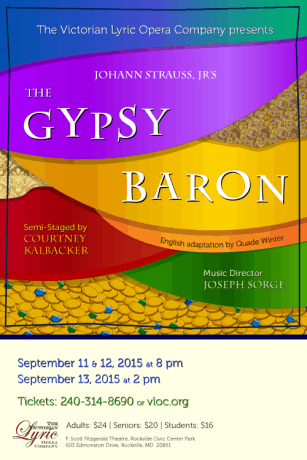One might not be surprised to hear Johann Strauss Jr’s The Gypsy Baron described as delightful and charming, as that is what a late 19th century Viennese operetta aspires to be, but fresh and contemporary might not be the first words that come to mind. The new production playing this weekend at Rockville’s F. Scott Fitzgerald Theatre is all these and more. Fans of The Victorian Lyric Opera Company who expect expert music and soaring voices will not be disappointed. Those new to the company or the genre who expect bustles and frock coats and antique lyrics and attitudes to match, are in for a surprise.
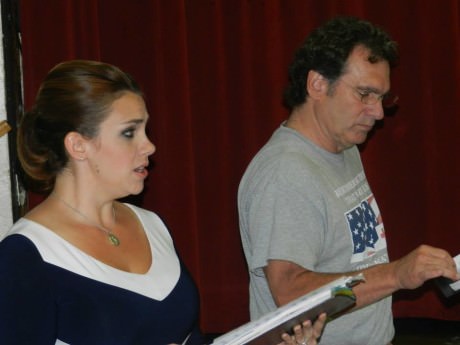
This is due in part to the staging. Although VLOC is renowned for their elaborate fully-staged productions, this Gypsy Baron is a concert version, with the chorus and orchestra on a bare stage in front of a simply-lit cyclorama, behind music stands where the principals place scores that they carry in with them. In some hands, this bare-bones staging might come across as sparse or unfinished, but here, Producer Denise Young and Director Courtney Kalbacker have stripped away distractions and allowed the best elements to shine.
First of these is the orchestra. When musicians are hidden in a pit, the Overture to a musical or opera sometimes risks feeling like a mere prelude, during which patrons (hopefully) put their cellphones away and wait for the real business of the evening to begin. But here, capable Music Director Joseph Sorge makes the orchestra an equal and vital complement to the vocalists. This is without a doubt the best orchestra I have ever heard in a non-professional production. 35-strong, it is larger than the chorus, and produces a very rich sound, especially in the winds and horns. Being able to see the musicians work their magic adds to the experience.
The oboe solos in the overture are particularly lovely, and it is a treat to watch the percussionists produce the sound of booming cannons and anvils ringing on the tympani and chimes (and to watch the first violinist cracking up during a particularly funny scene). The one drawback to this staging was that the orchestra somewhat overpowers the chorus, both visually and audibly. Fortunately there were supertitles (by Doug Maryott and Ross Capon) even though the lyrics were in English, and although they had a few minor timing glitches these hopefully will be worked out in subsequent performances.
In a sparsely staged production like this one, details stand out No costume designer is credited, and the singers wear generic but unobtrusive pseudo-Victorian and gypsy garb, with the chorus in standard black and white but with colorful scarves. This leaves the audience able to focus on Properties Designers Carl & Jane Maryott’s carefully chosen touches, such as the piggy slippers and sausage scarf that immediately define the pig farmer as the “buffo” character before he even opens his mouth, or later when he pulls out a can of Spam.
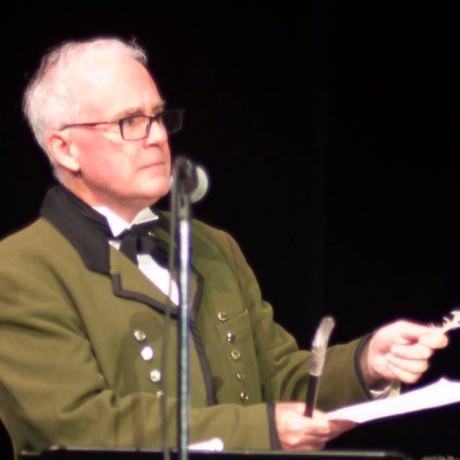
Small directorial touches have a large effect as well – like the conductor’s amusingly disgusted reaction when the gypsies in front of him spit on the ground each time a country that has rejected them is mentioned. (Only occasionally did the need for music stands prove awkward – such as when the long-sought treasure is finally found – only to be left on a chair practically in the wings when the singers turned back to their scores.)
Above all, the singing is the glory of this show. The chorus is capable, if somewhat muted, and although it seems evenly divided by gender, the female voices seem to carry more than the male. In the big numbers the ensemble provides a suitably strong foundation. They are well-led in the “Blacksmith Chorus” by Rand Huntzinger (Pali), and Kris Devine, Chezelle McDade, Leslie Ostransky, and Aleah Prentice are lovely as the young bride-to-be’s friends.
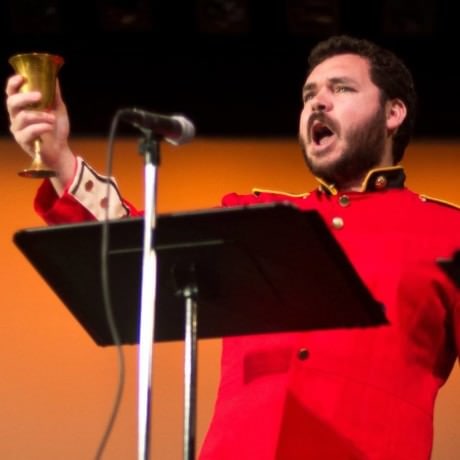
The main principals perform wonderfully, in both vocal and acting talent. The men are generally excellent. Kevin Schellhase (Ottokar) plays a charming ingénue tenor and Jeffrey Grayson Gates (Count Peter Homonay) provides a marvelous baritone surprise when he shows up in the middle of Act II. Gary Sullivan (Count Carnero) and Blair Eig (Kalman Zsupan) are perfectly cast in their comic roles as the priggish bureaucrat and the piggish farmer. But John Day stands out (as well he should) carrying the show as the tenor lead, Sandor Barinkay.
The women are nothing short of sublime, beautiful to the eye and the ear, each in her own way. Denise Young (Czipra), delivers her wise gypsy woman in a rich mezzo with a dollop of sly humor.
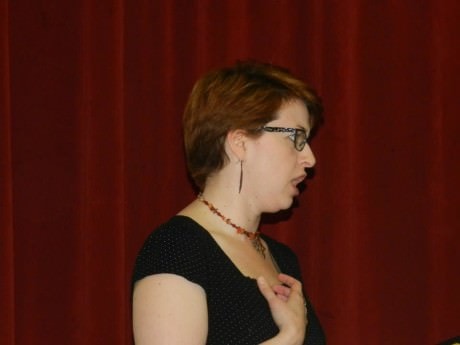
Marybeth Verchot’s (Mirabella) lovely mezzo voice is surpassed only by her terrific comic acting – her “boom!”s in her solo “The Battle of Belgrade” are a treat.
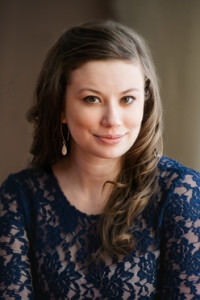
Rachel Ackerman (Arsena) gives what could be an insipid ingénue a wonderful teenage petulance in a clear, bright soprano voice.
But if to anyone, the show belongs to Cara Gonzales (Saffi), statuesque and expressive, with a glorious soprano voice that moves easily from the pathos of the “Gypsy Song” to comedy in “Wedding Duet” and back.
The greatest delight in The Gypsy Baron comes from its comedy. The performances are charming and funny. The trio of Sullivan, Eig, and Verchot, placed front and center during some others’ numbers, almost steal the scene without singing a note, with Sullivan petting Eig’s pet pig and Verchot producing an endless array of amusing reactions.
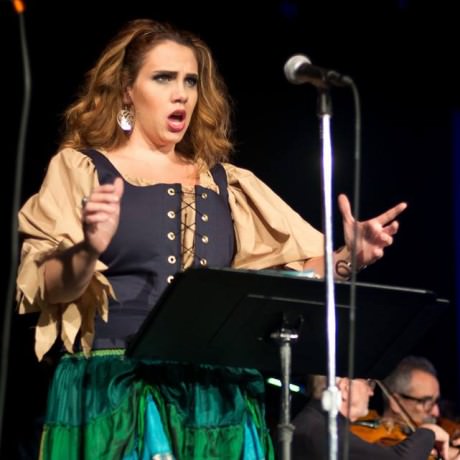
But the greatest comedy actually comes from the libretto, a modern translation by Quade Winter and Ross Halper, with lyrics that include pig latin and pig puns, lines such as “Oh, yuck!” and “boogie to the waltz” and references to tofu, spam, and Tenafly, New Jersey. This is not your grandmother’s operetta.
And while this all should not be taken any more seriously than the somewhat perplexing song about “wedding candy” that pops up in Act I, the plot did send my mind flitting to issues of prejudice, sympathy for stateless refugees, and morally rigid government officials banning other people’s marriages. While the sudden and (to this modern viewer) somewhat discomfiting Act II finale about the glories of going off to war marks it as rooted in another age, a show that proclaims “The only morals anybody cares about are somebody else’s” has one foot firmly in the modern era.
Delightful, charming, fresh, and contemporary – the only drawback of Victorian Lyric Opera Company’s The Gypsy Baron is it only runs two more performances. So get your tickets now!
The Gypsy Baron plays tonight at 8 PM and tomorrow at 2 pm, at The Victorian Lyric Opera Company performing at F. Scott Fitzgerald Theatre at The Rockville Civic Center – 603 Edmonston Drive, in Rockville, MD. For tickets, call the box office at (240) 314-8690, purchase them at the box office 2 hours before each performance, or purchase them online.


